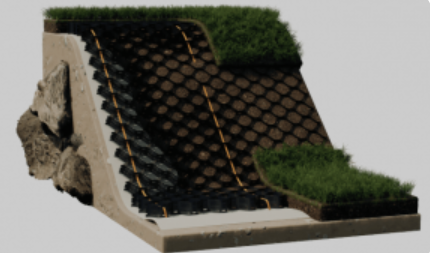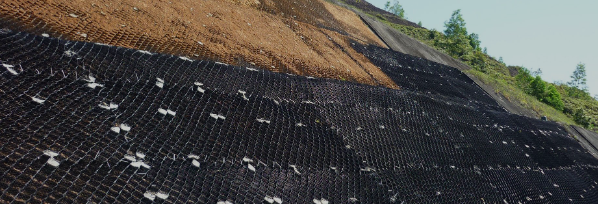- Geomembrane Liners: A Comprehensive Guide
- The Future of Geomembrane Liners in Civil Engineering
- Geomembrane Liners: Enhancing Landfill Stability
- The Importance of Geomembrane Liners in Pond Lining
- Choosing the Right Geomembrane Liner for Your Project
Manager:Alvin Wang
WhatsApp:+62 8983806051
Tel:+86 10-5797-1075
Email:steelwang@okorder.com
Address:3rd Floor, No.2 Building, No.1 Sanlihe Road
What is a Geocell driveway?
In the realm of modern construction and civil engineering, the pursuit of sustainable and efficient solutions is paramount. One such innovation that has gained significant attention in recent years is the Geocell driveway. But what exactly is a Geocell driveway, and how does it revolutionize slope protection? To understand this, it's crucial to delve into the concept of geocells and their application in slope protection.

Understanding Geocells
Geocells, also known as cellular confinement systems, are three-dimensional honeycomb-like structures made from high-density polyethylene (HDPE) or other durable materials. These cells are interconnected and filled with soil, aggregate, or concrete to create a stable foundation or surface. Geocells are renowned for their versatility and effectiveness in various civil engineering applications, including erosion control, load support, and slope protection.
The Importance of Slope Protection
Slope protection is a critical aspect of civil engineering, particularly in areas prone to erosion, landslides, or soil instability. Unprotected slopes are vulnerable to erosion caused by rainfall, surface runoff, and other environmental factors. Additionally, steep slopes can pose safety hazards and lead to property damage or infrastructure failures. Therefore, implementing robust slope protection measures is essential to mitigate these risks and ensure the long-term stability of embankments, roadways, and other structures.
Geocell Slope Protection
Geocells offer an innovative solution for slope protection by enhancing soil stability and erosion resistance. When installed on slopes, geocells confine and reinforce the soil, preventing erosion and promoting vegetation growth. The three-dimensional structure of geocells increases the frictional resistance of the soil, effectively anchoring it in place and resisting shear forces. This reinforcement helps to stabilize steep slopes and prevent soil displacement, even in challenging terrain conditions.
Advantages of Geocell Slope Protection
One of the primary advantages of geocell slope protection is its cost-effectiveness compared to traditional methods such as retaining walls or riprap. Geocells require less material and labor for installation, resulting in lower overall project costs. Additionally, geocell systems are lightweight and easy to transport, making them ideal for remote or inaccessible areas where heavy machinery may be impractical.
Furthermore, geocell slope protection offers environmental benefits by promoting sustainable vegetation growth and minimizing disturbance to natural habitats. The porous structure of geocells allows for efficient drainage and infiltration, reducing surface runoff and the risk of erosion. This eco-friendly approach aligns with modern principles of green engineering and sustainable development.
Applications of Geocell Slope Protection
Geocell slope protection is suitable for a wide range of applications, including highway embankments, riverbanks, coastal shorelines, and mining sites. In highway construction, geocells are used to stabilize roadside slopes, prevent soil erosion, and enhance road safety. Along riverbanks and coastlines, geocells help to control erosion and protect against wave action, preserving valuable ecosystems and infrastructure.
Moreover, geocells play a vital role in mine reclamation projects by stabilizing steep slopes and restoring disturbed landscapes. By promoting revegetation and soil stabilization, geocells facilitate the rehabilitation of mining sites and mitigate environmental impacts.
The Evolution of Geocell Technology
Over the years, advancements in geocell technology have led to the development of specialized products tailored to specific slope protection applications. Slope protection geocells are engineered with enhanced durability and tensile strength to withstand the demanding conditions of steep slopes and high-velocity flow. These geocells feature advanced design features such as cell confinement reinforcement and anchoring mechanisms to maximize soil retention and erosion control.
Geocell Driveways: A Practical Solution
Now, let's circle back to the concept of Geocell driveways. While the primary focus of geocell technology has been on slope protection and erosion control, its applications extend to other areas, including driveway construction. Geocell driveways utilize the same principles of soil confinement and reinforcement to create a stable and durable surface for vehicular traffic.
By incorporating geocells into driveway construction, homeowners and developers can enjoy several benefits. Geocell driveways offer superior load-bearing capacity and resistance to rutting, potholes, and surface deformation compared to conventional gravel or asphalt driveways. Additionally, geocell systems promote natural drainage and reduce the risk of sediment runoff, contributing to a cleaner and more sustainable environment.

Conclusion
In conclusion, a Geocell driveway represents a modern and innovative approach to driveway construction, harnessing the power of geocell technology for enhanced performance and sustainability. By leveraging the principles of geocell slope protection, Geocell driveways offer a cost-effective, environmentally friendly solution for homeowners, businesses, and municipalities alike. As the demand for resilient and eco-friendly infrastructure continues to grow, Geocell driveways are poised to play a significant role in shaping the future of civil engineering and construction."






